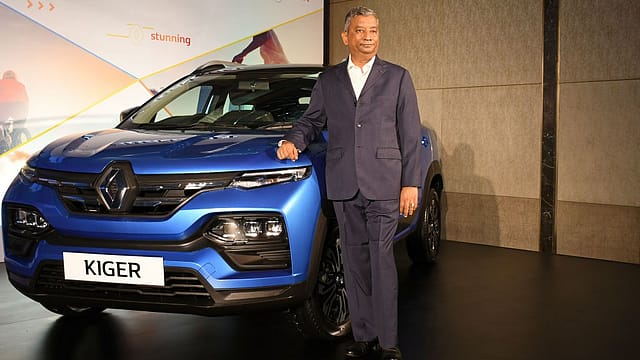Renault rethinks India strategy, plans a slew of launches for 5% market share by 2030
ADVERTISEMENT

French carmaker Renault is rethinking its India strategy as it looks to grow its market share from less than 1% in 2024-25 to 5% by the end of the decade.
Renault, which entered India in 2011, has struggled in the world’s third-largest car market by volume. But that is not stopping the French automobile giant from betting big on the country’s future growth.
The carmaker plans to launch five cars over the next two years. These include an electric vehicle and the new Duster, marking its re-entry into the mid-size SUV segment. Soon after its launch in 2012 in India, the Duster became a runaway success before it was discontinued in 2022.
Renault India currently plays in the sub-₹10 lakh segment with compact sport utility vehicle Kiger and seven-seater Triber, and small car Kwid. “We will now play in the bigger segment of ₹20 lakh, doubling the revenue stream,” Venkatram Mamillapalle, Country CEO and Managing Director at Renault India, tells Fortune India in an interview.
“Once we have all these five products in the market, we should touch 3% share,” he says.
Renault is buying out its global alliance partner Nissan’s 51% stake in Renault Nissan Automotive India Pvt Ltd to take over full ownership of the manufacturing plant in Chennai. “Renault India has to become a complete OEM rather than depending upon various other external alliances. One entity should take the decisions to be successful instead of having alliance partners take decisions. Therefore, it was decided that Renault will take over the full plant,” Mamillapalle says, adding that the acquisition reinforces Renault’s commitment to stay and grow in India
Mamillapalle says 2030 is a “drop-dead date” for Renualt India to increase its market share to 5%, or produce about 4.8 lakh units annually, otherwise the carmaker will not be able to manage the plant. “If you want to make the plant more viable and profitable, you have to run the plant at full capacity,” Mamillapalle, says.
This comes at a time when Renault India’s sales fell 17% year-on-year to 38,636 units in FY25, bringing down its market share from 1.18% in FY24 to 0.93% in FY25. The decline in sales was mainly due to Renault’s ageing product portfolio in India. “We have not upgraded our products. The novelty was missing for the customer when the competition was launching new cars,” says Mamillapalle.
With the lessons learnt from the past, the carmaker is looking to correct its future strategy. “We have made mistakes before. That will no longer happen because we have no choice today. We have to have car launches subsequently to meet the market requirements,” says Mamillapalle.
Renault India did not refresh its portfolio because of the weak financial situation on the global front, says Mamillapalle. Renault’s operations across the world suffered after the French carmaker pulled out of Russia following the Russia-Ukraine war. “After Covid-19, we had the semiconductor crisis, then the Ukraine war. Renault lost big money due to the Ukraine war because we had massive plants. That hit the balance sheet on a global scale. The market started declining in Europe. It was important for the company to survive their first and then take care of the rest of the world,” Mamillapalle says. “It was a purposeful decision to survive until we revive in Europe.”
But things have turned around since. Renault SA reported a historical operating profit of 4.3 billion euros in 2024 while its revenue rose 7.4% to 56.2 billion euros.
As Europe gets back on its feet, the carmaker is looking to spread its wings outside of Europe. Last year, Renault launched an international game plan which encompassed Brazil, South Korea, Turkey and India with an investment of 3 billion euros. “While Korea and Brazil have been taken care of, now it is time for India,” says Mamillapalle.
The French carmaker, which has sold about 1 million cars in the country cumulatively, is also exploring strong hybrid cars for India. “Electrification will take time. Today it is less than 2%. In the next 7-8 years, it will be 10-12%. It depends on the ecosystem and what government does with charging stations. We intend to bring hybrids to India,” says Mamillapalle.
As Renault takes over full control of the Chennai factory from Nissan, the carmaker has also set up the largest design studio outside of France in Chennai. “The speed at which we can launch cars lags competition. Their advantage is that everyone stays in the same time zone so decision-making is faster and the speed of execution is faster,” says Mamillapalle.
Even as it launches bigger SUVs over the next two years, Renault is not giving up on its small car, the Kwid, despite flagging sales. “We are not going to exit Kwid. I am not making money. I am very hopeful one day customers will turn back. I will continue to stay as long as regulations stop us,” says Mamillapalle.